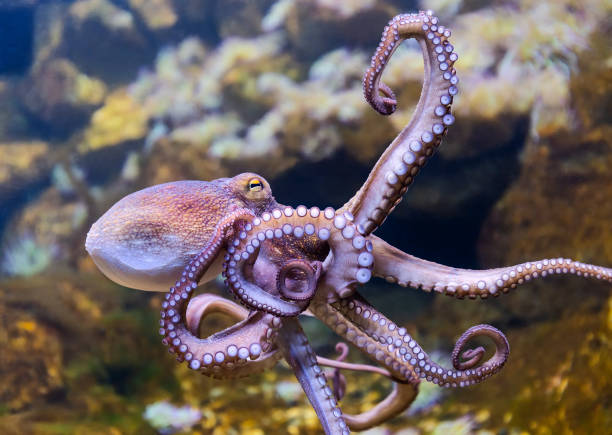Aquatic Acrobats: The Surprising World of Octopus Intelligence
Dive into the depths of the ocean and you'll encounter one of nature's most fascinating creatures: the octopus. These eight-armed wonders have long captivated marine biologists and casual observers alike with their remarkable abilities and enigmatic behavior. From problem-solving skills that rival those of some mammals to their uncanny ability to camouflage, octopuses continue to astound researchers and challenge our understanding of animal intelligence.

One of the most famous examples of octopus intelligence comes from a New Zealand aquarium, where an octopus named Inky made headlines in 2016 for his daring escape. Inky managed to squeeze through a small gap in his tank, traverse the aquarium floor, and slide down a 50-meter drainpipe to freedom in the nearby ocean. This remarkable feat showcases not only their physical dexterity but also their ability to plan and execute complex actions.
Masters of Disguise
Perhaps one of the most awe-inspiring abilities of octopuses is their masterful camouflage. Their skin contains specialized cells called chromatophores, which allow them to change color and texture in an instant. This skill isn’t just for show – it’s a vital survival mechanism that helps them evade predators and sneak up on prey.
What’s truly remarkable is the level of control octopuses have over their appearance. They can mimic the colors and patterns of their surroundings with astonishing accuracy, even replicating the movement of seaweed or the texture of coral. Some species, like the mimic octopus, can impersonate other marine creatures entirely, shape-shifting to look like sea snakes or lionfish to deter potential threats.
Problem-Solving Prodigies
Octopuses have repeatedly demonstrated their problem-solving abilities in laboratory settings. Researchers have presented them with various puzzles and challenges, and the results have been nothing short of impressive. In one study, octopuses were given jars containing food that could only be opened by turning a specific mechanism. Not only did the octopuses figure out how to open the jars, but they also remembered the solution when presented with the same puzzle days later.
Another fascinating aspect of octopus intelligence is their ability to learn through observation. In experiments where octopuses watched others solve puzzles, they were able to replicate the solution without prior training. This capacity for observational learning is typically associated with higher vertebrates and underscores the sophisticated cognitive abilities of these cephalopods.
The Neural Enigma
What makes octopus intelligence even more intriguing is the unique structure of their nervous system. Unlike vertebrates, whose intelligence is centralized in the brain, octopuses have a distributed nervous system. While they do have a central brain, a significant portion of their neurons are located in their arms. This decentralized neural network allows each arm to operate semi-autonomously, processing sensory information and controlling movement independently.
This peculiar neural architecture has led some researchers to speculate about the nature of octopus consciousness. With such a diffuse nervous system, do octopuses experience the world in a fundamentally different way than we do? The question remains open, but it highlights the fascinating complexity of these creatures and the challenges they pose to our understanding of animal cognition.
Emotional Intelligence and Social Behavior
Recent studies have begun to shed light on the emotional lives of octopuses, revealing a depth of feeling that was previously underappreciated. Observations of octopuses in both wild and captive settings have shown evidence of play behavior, a trait often associated with higher intelligence and emotional complexity. Octopuses have been seen interacting with objects in their environment in ways that appear to serve no immediate survival purpose, suggesting a capacity for curiosity and enjoyment.
Moreover, while octopuses are generally considered solitary creatures, some species have shown surprising social behaviors. The recently discovered larger Pacific striped octopus, for example, has been observed living in groups and engaging in complex mating rituals. These findings challenge our assumptions about octopus behavior and hint at a richer social life than previously thought.
Conservation Concerns
As our understanding of octopus intelligence grows, so too does the urgency to protect these remarkable creatures. Overfishing, habitat destruction, and climate change all pose significant threats to octopus populations worldwide. The growing demand for octopus in the seafood industry has led to increased fishing pressure, raising concerns about the sustainability of current practices.
Conservation efforts are underway in various parts of the world to protect octopus habitats and regulate fishing practices. However, more research is needed to fully understand the ecological needs of different octopus species and develop effective conservation strategies. As we continue to unravel the mysteries of octopus intelligence, it becomes increasingly clear that these fascinating creatures deserve our respect and protection.
In conclusion, the world of octopus intelligence is a frontier of scientific discovery that continues to challenge our understanding of animal cognition. From their problem-solving abilities to their emotional complexity, octopuses remind us that intelligence in the animal kingdom takes many forms. As we delve deeper into the mysteries of these aquatic acrobats, we not only expand our knowledge of marine life but also gain new perspectives on the nature of intelligence itself.





